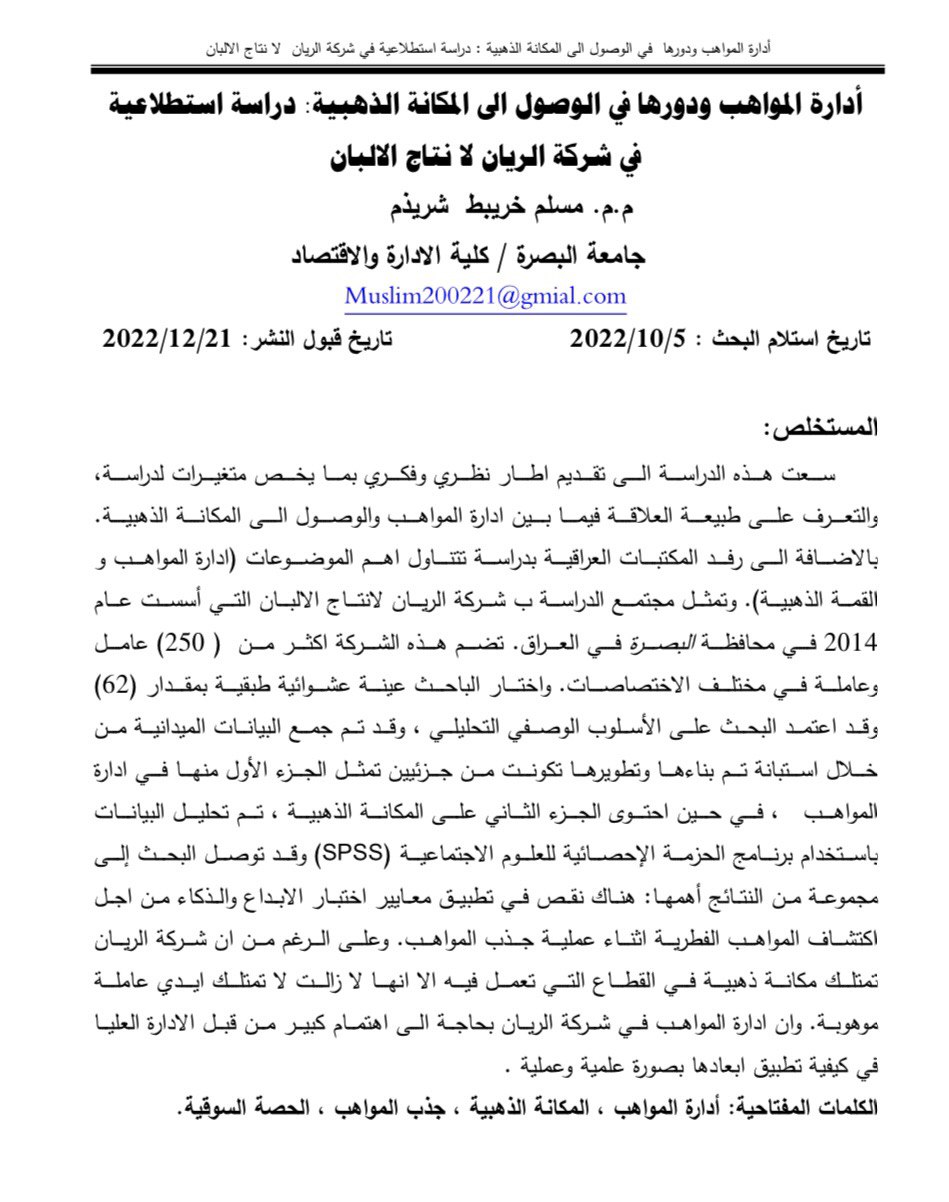أدارة المواهب ودورها في الوصول الى المكانة الذهبية: دراسة استطلاعية في شركة الريان لا نتاج الالبان
محتوى المقالة الرئيسي
الملخص
سعت هذه الدراسة الى تقديم اطار نظري وفكري بما يخص متغيرات لدراسة, والتعرف على طبيعة العلاقة فيما بين ادارة المواهب والوصول الى المكانة الذهبية. بالاضافة الى رفد المكتبات العراقية بدراسة تتناول اهم الموضوعات (ادارة المواهب و القمة الذهبية). وتمثل مجتمع الدراسة ب شركة الريان لانتاج الالبان التي أسست عام 2014 في محافظة البصرة في العراق. تضم هذه الشركة اكثر من ) 250) عامل وعاملة في مختلف الاختصاصات. واختار الباحث عينة عشوائية طبقية بمقدار (62) وقد اعتمد البحث على الأسلوب الوصفي التحليلي ، وقد تم جمع البيانات الميدانية من خلال استبانة تم بناءها وتطويرها تكونت من جزئيين تمثل الجزء الأول منها في ادارة المواهب ، في حين احتوى الجزء الثاني على المكانة الذهبية ، تم تحليل البيانات باستخدام برنامج الحزمة الإحصائية للعلوم الاجتماعية (Spss) وقد توصل البحث إلى مجموعة من النتائج أهمها: هناك نقص في تطبيق معايير اختبار الابداع والذكاء من اجل اكتشاف المواهب الفطرية اثناء عملية جذب المواهب. وعلى الرغم من ان شركة الريان تمتلك مكانة ذهبية في القطاع التي تعمل فيه الا انها لا زالت لا تمتلك ايدي عاملة موهوبة. وان ادارة المواهب في شركة الريان بحاجة الى اهتمام كبير من قبل الادارة العليا في كيفية تطبيق ابعادها بصورة علمية وعملية .
تفاصيل المقالة

هذا العمل مرخص بموجب Creative Commons Attribution-ShareAlike 4.0 International License.
المراجع
Reference
AR, IM (2019). “e Impact of Green Product Innovation on Firm Performance and Competitive Capability: e Moderating Role of Managerial Environmental Concern”. Procedia - Social and Behavioral Sciences, 62, pp.854-864.
BOBILLO, A, LÓPEZ-ITURRIAGA, F & TEJERINA-GAITE, F (2020). “Firm performance and international diversification: e internal and external competitive advantages”. International Business Review, 19(6), pp.607-618
Calo, T. J. E. I. C. P. (2018). Talent Management in the Era of the Aging Workforce: The Critical Role of Knowledge Transfer. Public Personnel Management,37(4)p: 403
CANTELE, S & ZARDINI, A (2018). “Is sustainability a competitive advantage for small businesses? An empirical analysis of possible mediators in the sustainability efinancialper France relationship”. Journal of Cleaner Production, 182(17), pp.166-176
Downe, Alan G., Loke, Siew-Phaik, Ho, Jessica Sze-Yin, Taiwo, Ayankunle Adegbite, m , " Corporate Talent Needs and Availability in Malaysian Service Industry " , International Journal of Business and Management, Vol. (7), No. (2), (2020)
GAMERO, L, AZORÍN, M & CORTÉS, C (2019). “e whole relationship between environmental variables and firm performance: competitive advantage and firm resources as mediator variables”. Journal of Environmental Management, 90(10), pp.3110-3121.
Garavan, T. N., Carbery, R., and Rock, A. (2021). Mapping Talent Development: Definition, Scope and Architecture. European Journal of Training and Development, 36(1)p: 5
Hartmann, E., Feisel, E. & Schober, H., ‘‘Talent management of western MNCs in China: balancing global integration and local responsiveness’’, Journal of World Business, Vol. (45) No. (2), (2020).
Higgins, B. (2020). An Analysis of the Effects of Integrated Instruction of Metacognitive and Study Skills Upon the Self-Efficacy and Achievement of Male and Female Students. (Master Thesis) Miami University, pp.2-63.
HIU, CN & Yang, CL (2018). “Competitive Advantage and Simultaneous Mutual Influences between Information Technology Adoption and Service Innovation: Moderating Effects of Environmental Factors”. Journal of
James A. Cannon, Rita McGree, " Talent Management and Succession Planning " , Chartered Institute of Personnel and Development, London, UK , (2021) .
KHAN, K, XUEHE, Z, ATLAS, F & KHAN, F (2019). “e impact of dominant logic and competitive intensity on SMEs performance: A case from China”. Journal of Innovation & Knowledge, 4(1), pp.1-11.
KIM, H & HOSKISSON, R (2018). “A Resource Environment View of Competitive Advantage”. Emerging Economies and Multinational Enterprises Advances in International Management, 28(95), pp.140.
LIAO, Z (2020). “Temporal cognition, environmental innovation, and the competitive advantage of enterprises”. Journal of Cleaner Production, 135(3), pp.1045-1053.
Lawler, E. E., III. (2018). Talent: Making People your Competitive Advantage. San Francisco, CA US:Jossey-Bass Hills, A. 2009. Succession planning — or Smart Talent Management?. Industrial and Commercial (12) Training, 41(1):p03
LI, G, WAN, X, SU, S & SU, Y (2019). “How green technological innovation ability influences enterprise competitiveness”. Technology in Society 2(4), pp.1-21.
Lyria, R. K. (2021). Thesis on Effects of Talent Management on Organization performance in Companies Listed in NSE in Kenya submitted to Jomo Kenyatta University of Agriculture and Technology for the award of Doctorate degree of Philosophy in Human Resource Management
MOLINER, P, AZORÍN, M & ORTEGA, P (2020). “e Holy Grail: Environmental management, competitive advantage and business performance in the Spanish hotel industry”. International Journal of Contemporary Hospitality Management, 27(5), pp.714–738.
MUKARTO SISWOYO, (2020), Competitive Advantage of Environmental Management and Green Innovation, DOI: https://doi.org/10.5281/zenodo.p415.584
Mwangi, W. (2019). Factors affecting talent management at Nation Media Group. Masters report, Strathmore Business School, Strathmore University, Nairobi.
Noe, Raymond et al., "Human Resource Management : Gaining A competitive Advantage" 6th Edition, McGraw-Hill Irwin, New York, (2018)
Pruis, E., " The five key principles for talent development " , Industrial and Commercial Training, Vol. (43), (2021(.
Redalyc: https://www.redalyc.org/articulo.oa?
RUA, O, FRANÇA & ORTIZ, RF (2021). “Key drivers of SMEs export performance: the mediating effect of competitive advantage”. Journal of Knowledge Management, 22(2), p257 .279.
SINGH, SK, CHEN, J, GIUDICE, MD & EL-KASSAR, AN (2019). “Environmental ethics, environmental performance, and competitive advantage: Role of environmental training”. Technological Forecasting and Social Change, 146(30), pp.203-211.
SINGJAI, K, WINATA, L & KUMMER, TF (2020). “Green initiatives and their competitive advantage for the hotel industry in developing countries”. International Journal of Hospitality Management, 75(14), pp.131-143.
Tarique, I., and Schuler, R. (2019). Global Talent Management Literature Review, Integrative Framework, and Suggestions for Further Research. Journal of world business, 45(2):p 105
Zhang, Shuai,& Bright, David, "Talent definition and talent management recognition in Chinese private-owned enterprises", Emerald Group Publishing Limited, Journal of Chinese Entrepreneurship, Vol. (4), No. (2), (2018) .
